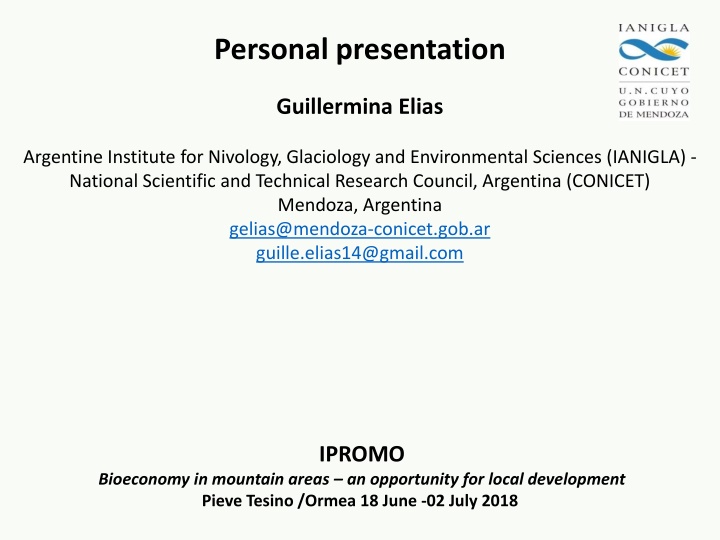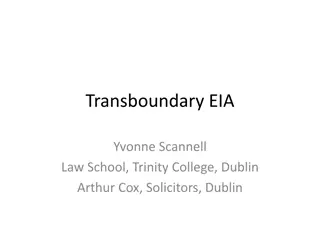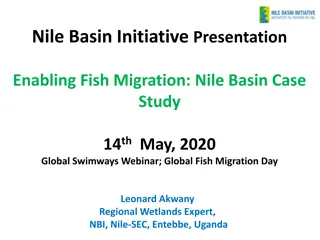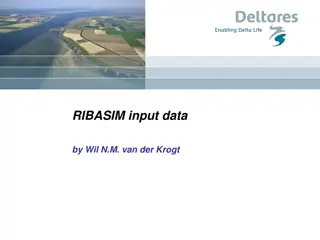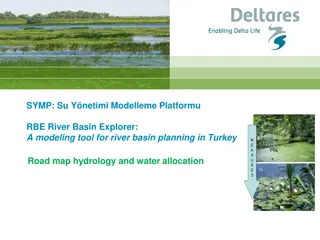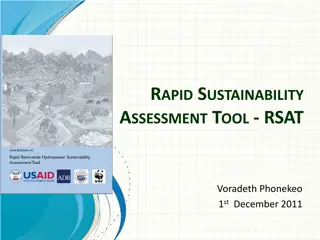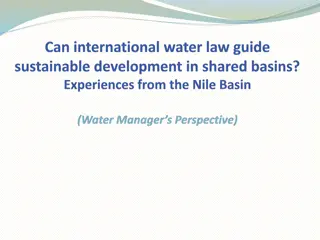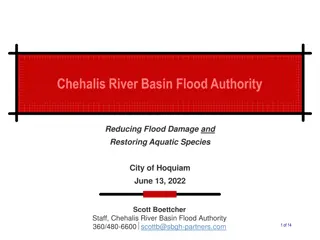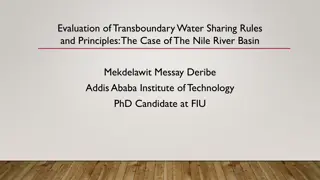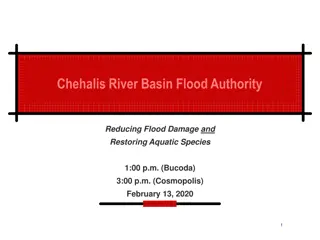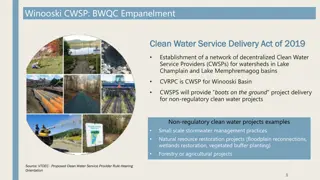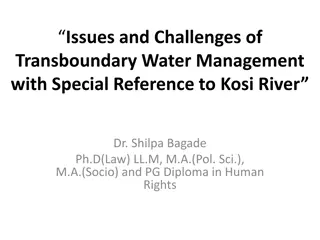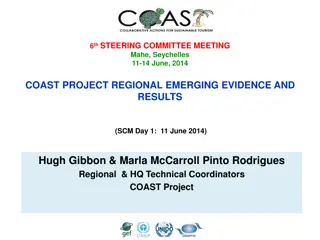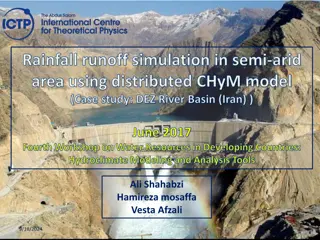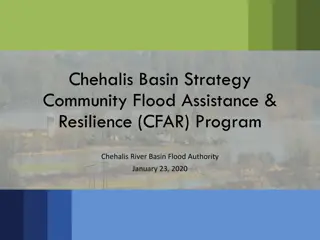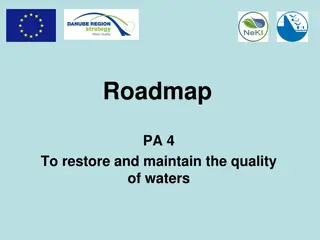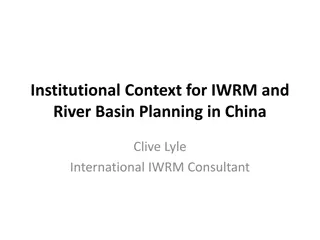Governance and Cooperation in Transboundary River Basin Management: A Case Study of the Bermejo River Basin
Guillermina Elias, a PhD candidate from Argentina, is researching governance and cooperation in managing the transboundary Bermejo River Basin shared by Argentina and Bolivia. The study focuses on analyzing mechanisms, capacities, stakeholder participation, and resource management from 1995 to 2018 to enhance integrated water management and institutional governance.
Download Presentation

Please find below an Image/Link to download the presentation.
The content on the website is provided AS IS for your information and personal use only. It may not be sold, licensed, or shared on other websites without obtaining consent from the author.If you encounter any issues during the download, it is possible that the publisher has removed the file from their server.
You are allowed to download the files provided on this website for personal or commercial use, subject to the condition that they are used lawfully. All files are the property of their respective owners.
The content on the website is provided AS IS for your information and personal use only. It may not be sold, licensed, or shared on other websites without obtaining consent from the author.
E N D
Presentation Transcript
Personal presentation Guillermina Elias Argentine Institute for Nivology, Glaciology and Environmental Sciences (IANIGLA) - National Scientific and Technical Research Council, Argentina (CONICET) Mendoza, Argentina gelias@mendoza-conicet.gob.ar guille.elias14@gmail.com IPROMO Bioeconomy in mountain areas an opportunity for local development Pieve Tesino /Ormea 18 June -02 July 2018
Education University Degree in International Relations. Congreso University, Mendoza. Specialist degree in Strategic Environmental Management. Congreso University, Mendoza. PhD Candidate in International Relations, Faculty of Political Science and International Relations, National University of Rosario, Argentina. Doctoral fellow at the Argentine Institute for Nivology, Glaciology and Environmental Sciences (IANIGLA) - National Scientific and Technical Research Council, Argentina (CONICET). Mendoza, Argentina, April 2016 up to the present. Employment and main activities Corporate and Market Image/Coordinator of Communications/Head of Corporate Affairs and Institutional Relations of international mining companies, 2006-2013. Professor of International Organizations, Degree in International Relations, Department of Political and Social Sciences, Congreso University, Mendoza. 2006 up to the present. Researcher at the Environmental and Development Department, International Relations Institute, Law and Social Faculty, National University of La Plata. 2013 up to the present. FAO environmental consultant for the Strategic Environmental Assessment of Cacique Guaymall n System Integral Program and for Santa Rosa and La Paz Modernization of Irrigation System Project. FAO (Food and Agriculture Organization of the United Nations), PROSAP (Programa de Servicios Agr colas Provinciales) and Departamento General de Irrigaci n (Irrigation Department). Mendoza, 2014 - 2016. Doctoral fellow at the Argentine Institute for Nivology, Glaciology and Environmental Sciences (IANIGLA) - National Scientific and Technical Research Council, Argentina (CONICET). Mendoza, Argentina, 2016 up to the present.
Other interests (volunteer work, hobbies etc.) Mountaineering and yoga lover. Arab folk and flamenco dancer. Active participant of the Lebanese diaspora in Argentina (cultural diffusion). First Aid and mountain medicine studies.
PhD project: Governance in transboundary basins: Bermejo and Grande de Tarija rivers basin, Argentina - Bolivia. The main objective is to analyze governance and cooperation between Argentina and Bolivia regarding resources management of Bermejo and Grande de Tarija rivers transboundary basin (1995-2018). Theoretical approaches of transboundary basins from the International Relations: governance- institutional cooperation and conflict/geopolitcs: Cooperation and Bermejo transboundary basin. Rebuilding binational mechanisms capacities. Stakeholders participation. Main issues identification, management resources. Basin as a Unit. to integrated water capacities/ management of governance institutional and Prieto y Rojas, 2015. regarding state, of shared the and use water
Bermejo river basin. The Bermejo river basin, shared between Argentina and Bolivia, is an important sub basin of Del Plata international basin. This basin is 123.162 km2and its main course is 1.300 km, divided in Up Basin (Up Basin Bolivia and Up Basin Argentina) and in Down Basin Argentina. Erotion index and sediments volume are one of the highest in the world. More than 100 million ton (80% equivalent among total) of sediments deposit at the Paraguay-Paran -La Plata rivers system. 1.3 millon people live in the basin, mainly rural and small agricultural workers, and indigenous with high poverty index. Binational Comission of the Bermejo River (COBINABE) was formed between Argentina and Bolivia through the Oran Agreement in 1996.
Bermejo river basin. Current construction of PhD conceptual and theoretical framework considering: Paradigm of Integrated Water Resources Management (IWRM): a process which promotes the coordinated development and management of water, land and related resources in order to maximise economic and social welfare in an equitable manner without compromising the sustainability of vital ecosystems and the environment. The basis of IWRM is that the many different uses of finite water resources are interdependent. IWRM is a systematic process for the sustainable development, allocation and monitoring of water resource use in the context of social, economic and environmental objectives. Under the IWMR paradigm, it is very important de bottom-up construction through communities participation. An integrated and holistic approach and multi-stakeholder processes to advance governance and management of water resources for sustainable and equitable development (Global Water Partnership, 2011). International Law General Principles on International Watercourses: Equitable and reasonable utilization and participation. Obligation not to cause significant harm. General obligation to cooperate. Regular exchange of data and information (Convention on the Law of the Non-navigational Uses of International Watercourses, United Nations; 1997).
